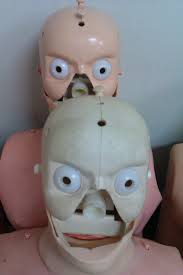In 1951, Hollywood director Edward Ludwig predicted computers would soon automatically write screenplays, and it’s difficult to see how they wouldn’t be capable of managing the flat dialogue of today’s globalized blockbusters. But machines don’t only want the starring roles–they’re also after us bit players. From Rob Enderle’s CIO report essay the so-called “robot apocalypse” and what it will mean for your job:
“It’s time for a discussion about what the future will bring. It won’t be world of lollipops and rainbows that [Marc] Andreessen and [Larry] Page will live in. The world of the rich won’t apply to the rest of us. Interestingly, Google Chairman Eric Schmidt better anticipates the ‘jobs and robots’ problem, but his solution is investing in startups, which is where we’ll all work while the robots do our existing jobs.
Sure, robots already do some jobs: Assembly lines, self-driving cars, delivery drones and cleaning robots, both the consumer Roomba and larger, industrial vacuums. There’s a bigger threat: Workers who basically look at numbers and draw conclusions. Robots are surprisingly good at this, too. Robots could do a range of jobs – including analysis, purchasing, consulting and journalism – because they can look at more real-time information in less time and with better recommendations than people.
This is one downside to big data analytics. Once you have the information, Watson, Siri, Cortana or any other artificial intelligence-like system can do a pretty decent job of identifying the best path. In the near term, at least, people will remain in the loop, but they’ll increasingly serve as little more than quality control – and, unfortunately, won’t operate fast enough to do the job properly.
Sheehy also created a spreadsheet that ranks the jobs that robots are most and least likely to take from people. The top jobs at risk: Financial analyst, financial advisor, industrial buyer, administrator, chartered legal executive (compliance officer) and financial trader. Least at risk: Clinical embryologist, bar manager, diplomatic services officer, community arts worker, international aid worker, dancer, aid/development worker and osteopath.
What’s interesting is that jobs that focus on dealing with people are relatively safe, while jobs that focus on analyzing things aren’t. Now if the people you focus on are increasingly unemployed, I have to wonder where the money’s coming from to pay the salaries of the people-focused folks. (Given that folks who write about technology need an audience to consume things to pay our salaries, we shouldn’t be sleeping that well, even though we aren’t on the list.)”
Tags: Edward Ludwig, Rob Enderle

